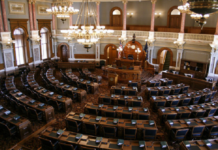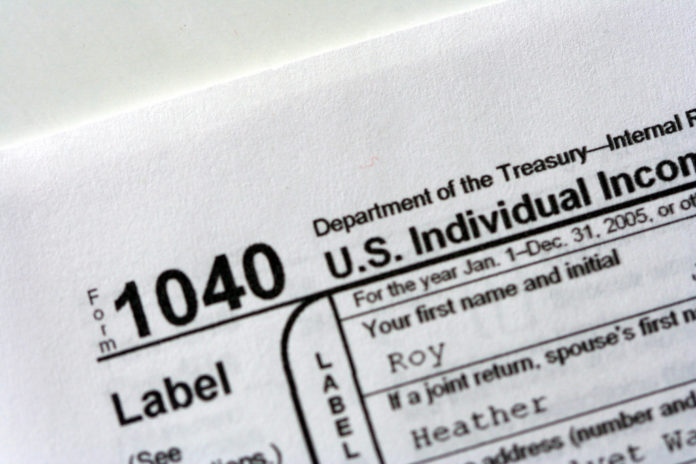(Updated with more reporting and edits throughout; correct votes on digital sales)
The Kansas Senate on Tuesday night passed a tax bill that will likely give up more than an estimated $1 billion in revenue over three years after Gov. Laura Kelly denounced a less costly version of the bill as “irresponsible” and “unthinkable.”
The Senate voted 24-15 to approve the bill after jettisoning proposals backed by the governor that would have applied a sales tax to some online transactions to fund tax relief by increasing the state’s standard deduction.
The cost of the bill is now at about $490 million for one year after starting at about $175 million. The cost balloons to likely more than $1 billion over three years.
There seemed to be some disagreement between Republican and Democratic senators about the cost of the bill.
Republican Sen. Caryn Tyson, chair of the Senate tax committee, said the cost of the bill in the first year would be $450 million, while Senate Minority Leader Dinah Sykes said it was $634 million in the first year and $1 billion over three years.
The Senate’s action revived memories of the tax cuts enacted under Gov. Sam Browmback in 2012, when the chamber added an array of amendments to a tax cut bill with the idea it would be so expensive it would never be signed into law.
The Senate passed the loaded-up bill in 2012 and the House agreed to the changes, handing Brownback the tax bill that was mostly reversed five years later when it was blamed for blowing holes in the state budget.
“Quite honestly I had a lot of deja vu today,” said Republican Sen Jeff Longbine, who was in the Senate back in 2012.
“There are not many of us who are in this body that were here in 2012 when we had a very, very similar day,” Longbine said.
“We took a reasonable, responsible tax bill and we blew it up.”
He remembered being called back into the Senate president’s office where he was assured the legislation passed by the Senate wouldn’t be “the bill” and that it was only intended to establish the chamber’s position for a conference committee.
“I spent five, six, seven years after that cutting budgets, raising sales taxes,” he said. “Fool me once, but you won’t fool me twice.”
Democratic state Sen. Ethan Corson was more direct.
“This a bullet-train to Brownbackville,” Corson said.
“Let’s make a U-turn. Let’s vote down this bad bill. Let’s go to work together on a bill that benefits Main Street businesses and working families, not Wall Street giant multinational corporations and the wealthiest Kansans,” he said.
After the vote, Tyson said she tried to bring forward a bill that would pass but added that one senator – she didn’t name who – tried to make his imprint on the bill that drove up the cost of the bill.
“I’m all for giving taxpayer money to the taxpayers,” Tyson said. “We don’t need to grow government, but we need to be diligent. I’ve tried to be wise in putting forth legislation that a majority could support. And we did get a majority of senators that did support it.”
The GOP-controlled Senate turned back attempts by Democrats to apply a sales tax to so-called marketplace facilitators, where companies such as Amazon allow third-party retailers to sell goods and services on their website. The amendment lost 26-11.
It also rejected an effort by Democrats to apply a sales tax on digital products such music downloads, movies, books and apps – something critics have dubbed the “Baby Yoda” tax, a reference to the creature named Grogu from “The Mandalorian” series on Disney+.
The digital tax was defeated 27-5.
The cost of the bill started out at about $175 million for one year – or $422 million for three years – after a Senate committee trimmed off a chunk of the bill in an effort to win passage of the legislation.
But in a four-hour debate that lasted from midafternoon into the early evening, the Senate added new measures that would jack up the cost of the tax bill to about $490 million for one year, something the governor has essentially indicated she would veto.
Among other things, the Senate added an amendment that would exempt Social Security benefits at a cost of $93 million and another one that would allow retirement benefits to be subtracted from income taxes at a cost of $125 million in just the first year alone.
Both amendents were introduced by Republican Sen. Dennis Pyle of Hiawatha.
Senate Republicans agreed to increase the standard deduction as proposed by the Democrats but without the taxes that would have covered the cost of the tax relief. The Senate voted unanimously to increase the standard deducation.
The bill would increase the standard deduction for single filers from $3,000 to $3,600 in tax year 2021 and $4,050 in 2022.
The deduction for married filers would increase from $7,500 to $9,000 in the 2021 and to $10,125 in 2022.
Increasing the standard deducation costs about $300 million for three years after it reaches $4,050 for single filers and $10,125 for married filers, according to the Department of Revenue.
The Democrats proposal would cover about 92% of the roughly 1.2 million Kansas who pay income taxes each year.
The tax bill originated as a result of federal tax reform in 2017 and has been hotly debated each of the last two legislative sessions.
Kelly vetoed two similar bills – albeit less pricey than the one passed Tuesday – and the Legislature couldn’t muster enough votes to override her veto.
Kansas is considered a “rolling conformity” state, meaning it must conform with any changes to the federal tax code automatically unless otherwise authorized by the Legislature.
As a result, the state has started collecting taxes from some sources it hadn’t previously received revenue from in the past.
Tyson said the bill passed by the Senate is intended to return money that taxpayers should not be paying in the first place because of changes in the federal tax code.
“They call this Brownback tax cuts,” she said. “Should we call it the Kelly tax increases?”
She said the tax bill benefits Kansans from all walks of life.
“There is something in this bill for everyone now,” Tyson said. “This is not a Wall Street bill. This is a Main Street bill. This is a rural street bill. This is an urban street bill. And it’s a bill for every single Kansan.”
The legislation would allow individuals to itemize on their state tax returns if they don’t itemize on their federal form.
Kansans are not likely to itemize on their state return after federal tax reform in 2017 boosted the federal standard deduction to $12,400 for a single person and $24,800 for a married couple.
Fewer and fewer Kansans have been itemizing since the federal tax code changes were passed in 2017.
About 99,100 itemized in 2019 compared to about 183,300 who itemized in 2017 before federal tax reform, state figures show.
However, the bill expands well beyond itemization to decouple from other parts of the federal tax code, including an exemption for income earned by foreign affiliates of U.S. companies from intangible assets such as patents, trademarks and copyrights.
The exemption for so-called global intangible low-taxed income is a controversial piece of similar legislation two years ago that Kelly vetoed and Democrats said it would benefit multinational companies at the expense of working Kansans.
The federal government started taxing global intangible low-taxed income as a way of ensuring that a minimum level of foreign income tax is paid on the earnings of the foreign subsidiaries of U.S. parent companies.
Supporters of the provision argue that Kansas has not taxed foreign income previously and question why the state should collect the tax now.
















